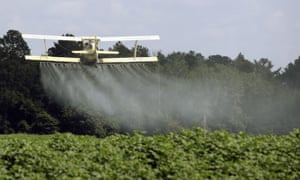
About 70% of fresh produce sold in the US has pesticide residues on
it even after it is washed, according to a health advocacy group.
According to the Environmental Working Group’s annual analysis of US
Department of Agriculture data, strawberries, spinach and kale are among
the most pesticide-heavy produce, while avocados, sweetcorn and
pineapples had the lowest level of residues.
More than 92% of kale tested contained two or more pesticide
residues, according to the analysis, and a single sample of
conventionally farmed kale could contain up to 18 different pesticides.
Dacthal – the most common pesticide found, which was detected in
nearly 60% of kale samples, is banned in Europe and classified as a
possible human carcinogen in the US.
“We definitely acknowledge and support that everybody should be
eating healthy fruits and vegetables as part of their diet regardless of
if they’re conventional or organic,” said Alexis Temkin, a toxicologist
working with the EWG.
“But what we try to highlight with the Shopper’s Guide to Produce is building on a body of evidence that shows mixtures of pesticides can have adverse effects.”
Other foods on the group’s “dirty dozen” list include grapes,
cherries, apples, tomatoes and potatoes. In contrast, its “clean 15”
list includes avocados, onions and cauliflower.
No comments:
Post a Comment